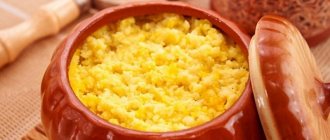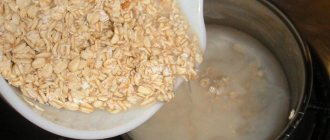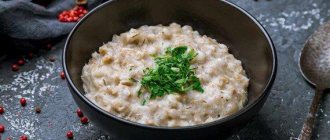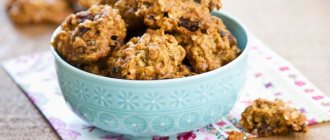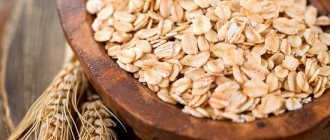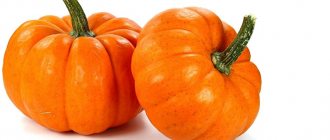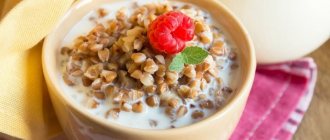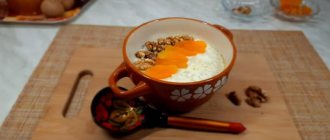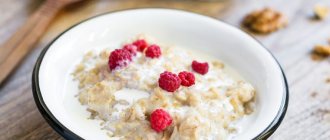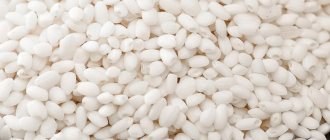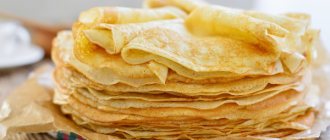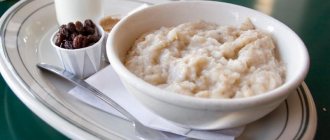Step-by-step preparation
45 min
We take round crushed rice, it is inexpensive, boils well, becoming fluffy. We rinse thoroughly “in seven waters.”
We wash the millet especially well so that all the bitterness is gone.
Mix millet and rice in a saucepan and fill with water.
Cook for 10 minutes over medium heat, stirring occasionally to prevent burning. The water will almost all boil away.
Add milk, salt and sugar. Bring to a boil. We constantly make sure that the milk does not escape. We continue stirring.
Simmer for 10 minutes on the lowest heat. The mixture should gurgle with small bubbles. Stir occasionally, making sure it doesn't burn.
Turn off the heat, close the lid and cover with a warm towel on top. Let it sit for 15-20 minutes. The porridge will swell further and become thicker.
“Friendship” is ready! We put butter on the plate and enjoy trying what we got.
Other recipes
- With pumpkin
Our beautiful, delicious “Friendship” will become even more beautiful if you cook it with pumpkin. It’s great if you grow this super vegetable yourself, but if not, buy pumpkin at any hypermarket. Today it is not necessary to buy it whole; it is sold cut into pieces. You only need 300 g of pumpkin, but the porridge will immediately be transformed - it will become more tender and jelly-like. The calorie content will be reduced, a bright orange color, sweetness and beneficial microelements will be added. Be sure to cook this option and please yourself and your loved ones.
- With egg
We cook everything as usual. Place the prepared hot porridge on a plate and immediately break a fresh egg into it. The high temperature will cause the white to curdle a little, but the yolk will remain runny. This is an interesting and unusual dish. Although you can only use village fresh or quail eggs to protect yourself from salmonella and other “raw egg diseases”. If you have never eaten such “big-eyed Friendship”, be sure to cook it and try it. It is delicious!
- With sour cream
Let's continue experimenting. Add fresh fat sour cream. This should make the food richer. Let's cook according to the classic simple recipe, and at the very end add half a glass of sour cream and let it brew so that the porridge becomes light and tender. You don’t need to add butter to “Druzhba” with sour cream; it already has enough fat content. As they say, there is no accounting for taste, and if you like sour cream, then feel free to add it to this porridge, it will only benefit from it.
- In a slow cooker
Let's prepare “Friendship” in the cartoon. I know for sure that it will turn out quickly and tasty. And the recipe couldn’t be simpler. We put all the ingredients in the bowl, press a couple of buttons - and in 20 minutes everything is ready, because the multicooker will do everything itself. Great! When laying out the porridge on plates, add a little butter or ghee, although you can also use vegetable oil. For example, I like it with unrefined sunflower oil. Try it yourself, you will like it!
- On the water
If you don’t drink milk or you don’t happen to have any on hand, you can cook it in water. It will be delicious too. We have the same task: to make the porridge boil well and become fluffy, so we cook longer over low heat. You can add water if it has all boiled away. To add richness and give it a milky taste, add more butter or melted butter to the finished dish, because “you can’t spoil porridge with butter.”
Benefits for the body
We add up the benefits of rice and the beneficial properties of millet and get a super-mix “double benefit”, because the simple porridge “Friendship”:
- due to rice, it is a sorbent and removes toxins and heavy metal salts from the body;
- due to millet, it is rich in potassium, vitamin D, which we need for the growth of bones, hair and nails, vitamins A, PP, group B;
- easily absorbed by the body and strengthens the immune system;
- has a beneficial effect on the functioning of the digestive system, as it has a high content of vegetable protein and “slow” carbohydrates.
Porridge has always been the basis of proper nutrition. Even in Rus' they said, “Without porridge, lunch is not lunch.” Today, nutritionists and doctors around the world advise eating porridge every day.
Detailed composition, per 100 grams of the finished dish: “Druzhba porridge”
| compound | quantity | product with the highest content |
| Proteins, g | 3.46 | wild rice (40%) |
| Fats, g | 1.51 | milk (73%) |
| Carbohydrates, g | 14.82 | wild rice (48%) |
| Calorie content, kcal | 83.82 | wild rice (40%) |
| Water, g | 78.39 | water (59%) |
| Vanadium, mcg | — | — |
| Vitamin A, mg | 0.00 | milk (88%) |
| Vitamin B1, mg | 0.05 | millet (72%) |
| Vitamin B12, mcg | 0.13 | milk (100%) |
| Vitamin B2, mg | 0.07 | milk (95%) |
| Vitamin B5, mg | — | — |
| Vitamin B6, mg | 0.06 | millet (72%) |
| Vitamin B9, mcg | 5.35 | millet (67%) |
| Vitamin C, mg | 0.45 | milk (100%) |
| Vitamin D, mcg | 0.01 | milk (100%) |
| Vitamin E, mg | 0.26 | millet (88%) |
| Vitamin H, mcg | 1.11 | milk (100%) |
| Vitamin PP, mg | 0.17 | millet (79%) |
| Aluminum, µg | 26.43 | milk (65%) |
| Boron, µg | — | — |
| Iron, mg | 0.28 | millet (85%) |
| Ash, g | 0.35 | milk (67%) |
| Iodine, mcg | 3.53 | milk (88%) |
| Potassium, mg | 69.90 | milk (72%) |
| Calcium, mg | 44.82 | milk (93%) |
| Cobalt, µg | 1.05 | millet (71%) |
| Starch, g | 5.86 | millet (100%) |
| Silicon, mg | — | — |
| Lithium, mcg | — | — |
| Magnesium, mg | 12.38 | millet (60%) |
| Manganese, mcg | 86.62 | millet (97%) |
| Copper, µg | 38.10 | millet (87%) |
| Molybdenum, mcg | 3.60 | milk (48%) |
| Mono- and disaccharides, g | 1.78 | milk (91%) |
| Sodium, mg | 18.93 | milk (91%) |
| Unsaturated fatty acids, g | — | — |
| Nickel, µg | 0.79 | millet (100%) |
| Tin, µg | 5.40 | milk (83%) |
| Organic acids, g | 6.76 | table salt (99%) |
| Dietary fiber, g | 0.23 | table salt (73%) |
| Rubidium, mcg | — | — |
| Selenium, mcg | 0.69 | milk (100%) |
| Sulfur, mg | 17.36 | milk (58%) |
| Strontium, mcg | 5.91 | milk (100%) |
| Titanium, µg | 1.80 | millet (100%) |
| Phosphorus, mg | 52.37 | milk (59%) |
| Fluorine, mcg | 9.48 | milk (73%) |
| Chlorine, mg | 144.24 | table salt (71%) |
| Cholesterol, mg | — | — |
| Choline, mg | 8.20 | milk (100%) |
| Chromium, µg | 0.91 | milk (76%) |
| Zinc, mcg | 292.10 | millet (52%) |
| Glycemic index, | 21.15 | milk (49%) |
| view: detail | briefly | carbohydrates | calories |
Useful tips
- Use the cheapest round rice. It boils better, and for porridge this is the main thing.
- Take an equal amount of cereal. Rice and millet are combined because they have the same cooking time. You can also combine rice and buckwheat, but this is not for everybody.
- To make “Friendship” cook faster, it is first boiled in water, then milk is added. Although you can immediately cook it in milk, it is much more difficult to monitor it.
- “Friendship” can be cooked viscous or crumbly, it will depend on how much milk you add.
- To diversify the taste, add honey or raisins, dried apricots, nuts, and berries.
- The main thing in preparing this porridge is that it steams well, so it can be cooked in the oven, microwave, slow cooker and, if possible, in a Russian oven.
- If you have time, then transfer the porridge to a kettle or roasting pan and put it in the oven for 20-30 minutes over low heat. There it will swell, becoming soft like a cloud.
- When cooking the porridge, be sure to stir it with a spoon so that it does not burn.
- When starting to cook, immediately pour hot water over the cereal, because if you add cold water while the water is warming up, the cereal may stick to the bottom of the pan.
- If you do not add sugar, you will get a salty porridge. It can be used as a side dish for meat dishes: cutlets, meatballs, goulash.
Friendship porridge recipe with milk. Calorie, chemical composition and nutritional value.
Nutritional value and chemical composition of “Friendship porridge with milk.”
The table shows the nutritional content (calories, proteins, fats, carbohydrates, vitamins and minerals) per 100 grams of edible portion.
| Nutrient | Quantity | Norm** | % of the norm in 100 g | % of the norm in 100 kcal | 100% normal |
| Calorie content | 122.1 kcal | 1684 kcal | 7.3% | 6% | 1379 g |
| Squirrels | 4.2 g | 76 g | 5.5% | 4.5% | 1810 |
| Fats | 3.8 g | 56 g | 6.8% | 5.6% | 1474 g |
| Carbohydrates | 17.6 g | 219 g | 8% | 6.6% | 1244 g |
| Organic acids | 0.1 g | ~ | |||
| Alimentary fiber | 0.6 g | 20 g | 3% | 2.5% | 3333 g |
| Water | 73.9 g | 2273 g | 3.3% | 2.7% | 3076 g |
| Ash | 1.025 g | ~ | |||
| Vitamins | |||||
| Vitamin A, RE | 16.2 mcg | 900 mcg | 1.8% | 1.5% | 5556 g |
| Retinol | 0.016 mg | ~ | |||
| beta carotene | 0.008 mg | 5 mg | 0.2% | 0.2% | 62500 g |
| Vitamin B1, thiamine | 0.052 mg | 1.5 mg | 3.5% | 2.9% | 2885 g |
| Vitamin B2, riboflavin | 0.112 mg | 1.8 mg | 6.2% | 5.1% | 1607 g |
| Vitamin B4, choline | 21.98 mg | 500 mg | 4.4% | 3.6% | 2275 g |
| Vitamin B5, pantothenic | 0.258 mg | 5 mg | 5.2% | 4.3% | 1938 |
| Vitamin B6, pyridoxine | 0.072 mg | 2 mg | 3.6% | 2.9% | 2778 g |
| Vitamin B9, folates | 5.036 mcg | 400 mcg | 1.3% | 1.1% | 7943 g |
| Vitamin B12, cobalamin | 0.168 mcg | 3 mcg | 5.6% | 4.6% | 1786 |
| Vitamin C, ascorbic acid | 0.38 mg | 90 mg | 0.4% | 0.3% | 23684 g |
| Vitamin D, calciferol | 0.049 mcg | 10 mcg | 0.5% | 0.4% | 20408 g |
| Vitamin E, alpha tocopherol, TE | 0.086 mg | 15 mg | 0.6% | 0.5% | 17442 g |
| Vitamin H, biotin | 3.609 mcg | 50 mcg | 7.2% | 5.9% | 1385 g |
| Vitamin K, phylloquinone | 0.4 mcg | 120 mcg | 0.3% | 0.2% | 30000 g |
| Vitamin RR, NE | 1.3737 mg | 20 mg | 6.9% | 5.7% | 1456 g |
| Niacin | 0.371 mg | ~ | |||
| Macronutrients | |||||
| Potassium, K | 153.17 mg | 2500 mg | 6.1% | 5% | 1632 g |
| Calcium, Ca | 97.47 mg | 1000 mg | 9.7% | 7.9% | 1026 g |
| Silicon, Si | 16.993 mg | 30 mg | 56.6% | 46.4% | 177 g |
| Magnesium, Mg | 23.52 mg | 400 mg | 5.9% | 4.8% | 1701 g |
| Sodium, Na | 152.58 mg | 1300 mg | 11.7% | 9.6% | 852 g |
| Sera, S | 36.41 mg | 1000 mg | 3.6% | 2.9% | 2746 g |
| Phosphorus, P | 109.6 mg | 800 mg | 13.7% | 11.2% | 730 g |
| Chlorine, Cl | 255.51 mg | 2300 mg | 11.1% | 9.1% | 900 g |
| Microelements | |||||
| Aluminium, Al | 138.3 mcg | ~ | |||
| Bor, B | 33.7 mcg | ~ | |||
| Vanadium, V | 31 mcg | ~ | |||
| Iron, Fe | 0.447 mg | 18 mg | 2.5% | 2% | 4027 g |
| Yod, I | 6.03 mcg | 150 mcg | 4% | 3.3% | 2488 g |
| Cobalt, Co | 1.637 mcg | 10 mcg | 16.4% | 13.4% | 611 g |
| Lithium, Li | 1.182 mcg | ~ | |||
| Manganese, Mn | 0.216 mg | 2 mg | 10.8% | 8.8% | 926 g |
| Copper, Cu | 70.62 mcg | 1000 mcg | 7.1% | 5.8% | 1416 g |
| Molybdenum, Mo | 6.456 mcg | 70 mcg | 9.2% | 7.5% | 1084 g |
| Nickel, Ni | 1.114 mcg | ~ | |||
| Tin, Sn | 13.03 mcg | ~ | |||
| Rubidium, Rb | 4.6 mcg | ~ | |||
| Selenium, Se | 2.347 mcg | 55 mcg | 4.3% | 3.5% | 2343 g |
| Strontium, Sr | 25.65 mcg | ~ | |||
| Titanium, Ti | 3.88 mcg | ~ | |||
| Fluorine, F | 23.72 mcg | 4000 mcg | 0.6% | 0.5% | 16863 g |
| Chromium, Cr | 2.01 mcg | 50 mcg | 4% | 3.3% | 2488 g |
| Zinc, Zn | 0.6224 mg | 12 mg | 5.2% | 4.3% | 1928 |
| Zirconium, Zr | 1.8 mcg | ~ | |||
| Digestible carbohydrates | |||||
| Starch and dextrins | 13.32 g | ~ | |||
| Mono- and disaccharides (sugars) | 4.2 g | max 100 g | |||
| Glucose (dextrose) | 0.031 g | ~ | |||
| Maltose | 0.017 g | ~ | |||
| Sucrose | 0.149 g | ~ | |||
| Fructose | 0.037 g | ~ | |||
| Essential amino acids | 0.007 g | ~ | |||
| Arginine* | 0.092 g | ~ | |||
| Valin | 0.088 g | ~ | |||
| Histidine* | 0.043 g | ~ | |||
| Isoleucine | 0.075 g | ~ | |||
| Leucine | 0.212 g | ~ | |||
| Lysine | 0.055 g | ~ | |||
| Methionine | 0.045 g | ~ | |||
| Methionine + Cysteine | 0.077 g | ~ | |||
| Threonine | 0.064 g | ~ | |||
| Tryptophan | 0.028 g | ~ | |||
| Phenylalanine | 0.094 g | ~ | |||
| Phenylalanine+Tyrosine | 0.163 g | ~ | |||
| Nonessential amino acids | 0.009 g | ~ | |||
| Alanin | 0.144 g | ~ | |||
| Aspartic acid | 0.118 g | ~ | |||
| Glycine | 0.061 g | ~ | |||
| Glutamic acid | 0.337 g | ~ | |||
| Proline | 0.112 g | ~ | |||
| Serin | 0.102 g | ~ | |||
| Tyrosine | 0.069 g | ~ | |||
| Cysteine | 0.032 g | ~ | |||
| Sterols (sterols) | |||||
| Cholesterol | 8.92 mg | max 300 mg | |||
| beta sitosterol | 1.957 mg | ~ | |||
| Saturated fatty acids | |||||
| Saturated fatty acids | 2.2 g | max 18.7 g | |||
| 4:0 Oil | 0.05 g | ~ | |||
| 6:0 Kapronovaya | 0.023 g | ~ | |||
| 8:0 Caprylic | 0.012 g | ~ | |||
| 10:0 Kaprinovaya | 0.028 g | ~ | |||
| 12:0 Lauric | 0.032 g | ~ | |||
| 14:0 Miristinovaya | 0.15 g | ~ | |||
| 16:0 Palmitinaya | 0.453 g | ~ | |||
| 18:0 Stearic | 0.136 g | ~ | |||
| 20:0 Arakhinovaya | 0.002 g | ~ | |||
| Monounsaturated fatty acids | 1.126 g | min 16.8 g | 6.7% | 5.5% | |
| 14:1 Myristoleic | 0.029 g | ~ | |||
| 16:1 Palmitoleic | 0.044 g | ~ | |||
| 18:1 Oleic (omega-9) | 0.418 g | ~ | |||
| Polyunsaturated fatty acids | 0.292 g | from 11.2 to 20.6 g | 2.6% | 2.1% | |
| 18:2 Linolevaya | 0.215 g | ~ | |||
| 18:3 Linolenic | 0.004 g | ~ | |||
| Omega-6 fatty acids | 0.3 g | from 4.7 to 16.8 g | 6.4% | 5.2% |
The energy value of Friendship Porridge with milk is 122.1 kcal.
Primary Source: Created in the application by the user. Read more.
** This table shows the average levels of vitamins and minerals for an adult. If you want to know the norms taking into account your gender, age and other factors, then use the “My Healthy Diet” application.
